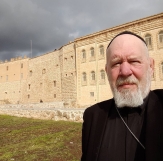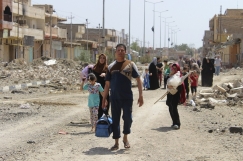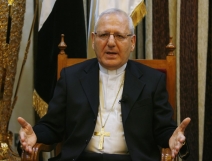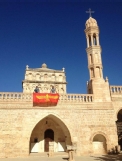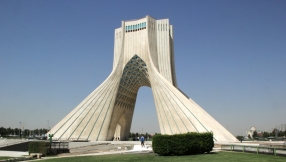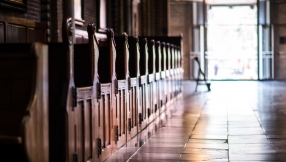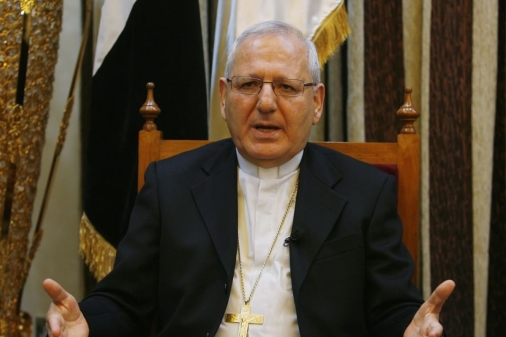
Assyrian leaders have hit back at the Chaldean patriarch who last week urged the US not to arm Christian forces fighting ISIS in the Middle East.
In a statement sent out on Thursday, the Assyrian Confederation of Europe (ACE) said it was concerned by Patriarch Louis Raphael I Sako's comments.
"There is broad agreement between Assyrian organisations in Iraq and the diaspora that Assyrians must actively participate in the military campaign to liberate the Nineveh Plain and secure the area after the liberation," the statement said.
"The Nineveh Plain Protection Units (NPU), which is tasked with that mandate, is officially recognised and supported by the Iraqi government, in direct contradiction to the Patriarch's claims."
The importance of so-called 'Christian militias' was made "abundantly clear", the statement continues, following the abandonment of the Assyrians in the Nineveh Plain by the Kurdish Peshmerga.
Assyrian Christians are among a number of religious minorities who have suffered immensely under Islamic State over the past two years.
"Mar Sako's urging of the United States to support the Peshmerga instead of Assyrian forces is a clear illustration of how utterly at odds his ideas are with the real needs of Assyrians in Iraq. Assyrian-led military participation is essential if displaced Assyrians are to return to Nineveh, as Patriarch Sako claims that he wishes them to," ACE said.
"Patriarch Sako has on several occasions expressed a desire to separate religion from state in Iraq. It is therefore embarrassingly inconsistent of him to continue to interfere in the political affairs of his people. We urge Louis Sako not to confuse his role as a religious figure with that of a political leader, just as political and secular leaders refrain from passing comment on theology or ecclesiastical affairs."
In a May 20 interview with Vatican Radio, Sako stated his opposition to Christian militias.
He told Fides news agency that supporting Christian forces would be "a bad idea".
"There are no 'Christian militias', but only politicized groups and simple people who are in desperate need of a salary," he said. "The remaining Christians in Iraq are only the poor and those belonging to the middle class, and among them, there are 100 thousand displaced people."
"It is a total mess!" Sako added. "Everyone wants to exploit Christians of Nineveh Plain for their ambitions and political interests. It is an area with different ethnic groups and religious communities... I am afraid that all these talks will turn Nineveh Plain into a continuing conflict region, and in this case, no Christian will return to their homes.
"Christians, if they want to have a future, must integrate themselves with the institutions and follow the legitimate authorities that govern the place where they live," he said. "And if the US really want to defeat Daesh [ISIS], they have to support the regular armies that are part of the central government and the autonomous Kurdistan government, instead of creating sectarian militias".
The Patriarch was responding to a defence spending bill currently headed for authorisation by the US Congress and Senate. It specifically refers to Christian security forces as a group that should be supported. A report says: "The committee believes that the United States should support appropriately vetted, effective indigenous groups such as Iraqi Christian militias, with a national security mission."
Steve Oshana, executive director of A Demand for Action – a campaign group that has pushed for the legitimacy of Christian militias to be recognised – previously told Christian Today the move was a "huge step forward".
"This is significant because Christian forces in Iraq and Syria have spent the past 18 months building capacity, and in Syria one group has already received support from the US," he said.
"It's significant because it shows a greater US commitment to supporting Christians and more importantly acknowledging their legitimacy as fighting forces in Iraq and Syria."
Congressman Jeff Fortenberry last week commended the bill for expanding protections for religious minorities in Iraq.
"Two months ago, Congress declared that ISIS is committing genocide against Christians, Yezidis, and other minorities. The House of Representatives has now taken concrete steps to support the victims," he said.
"Christians, Yezidis, and others should remain an essential part of the Middle East's once rich tapestry of ethnic and religious diversity. They now have new cause for hope."
ACE called on the international community to support Christians fighting ISIS "with arms, training and other resources".
It also said that political statement made by religious figures in the Middle East should be disregarded "as they are not democratically elected by the people and do not represent the Assyrian people politically."








